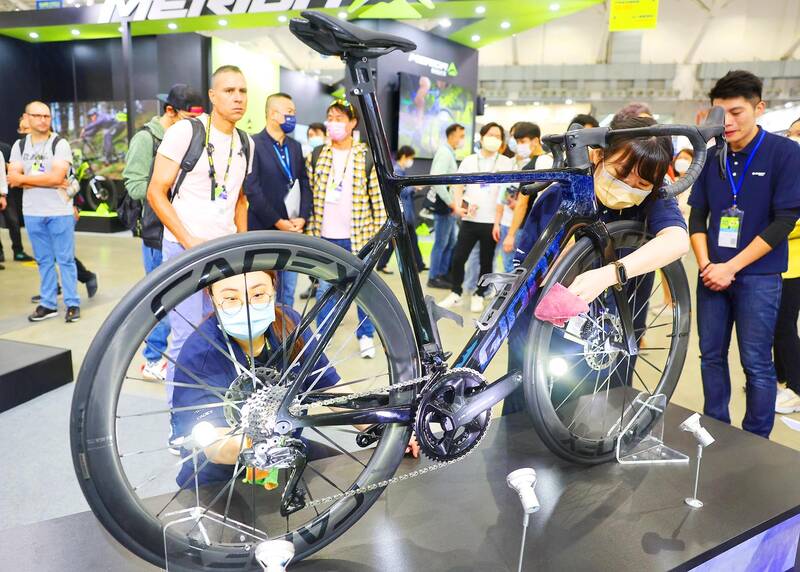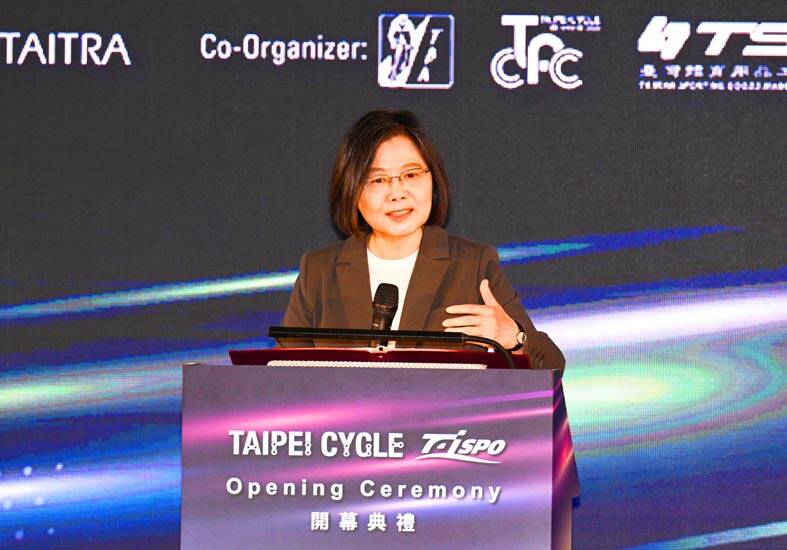The Taipei Cycle show and the Taipei International Sporting Goods Show (TaiSPO) opened at the Taipei Nangang Exhibition Center’s Hall 1 and 2 yesterday, making the exhibitions the first to physically welcome visitors from around the world after Taiwan reopened its borders in October last year.
About 4,000 foreign visitors from more than 90 countries registered in advance to attend the joint fair, which is to include on-site events running through Saturday and digital shows continuing until April 7, the organizer said in a statement yesterday.
The Taipei Cycle and TaiSPO have attracted 1,023 companies, which showcase their products at 3,850 booths, making it the largest cycling and sports fitness industry event in Asia, the Taiwan External Trade Development Council (TAITRA, 外貿協會) said in the statement.

Photo: CNA
The fair also boasts the highest-density business platform for the global high-end bicycle and sports fitness supply chain, TAITRA said, adding that it expects it to result in substantial business opportunities for local firms.
With the launch of several special exhibitions at which products are categorized by usage purpose, it is expected to assist foreign companies to conveniently source products that meet their requirements and the importing countries’ regulations, it added.
“Taiwan is an important center for the production and research and development of bicycles and fitness products. Last year, the output value of bicycles exceeded NT$200 billion [US$6.55 billion], a substantial increase of 23 percent from the previous year, and ranked second in the world,” President Tsai Ing-wen (蔡英文) said at the event’s opening ceremony.

Photo: Tien Yu-hua, Taipei Times
In addition, Taiwan exported more than 1 million electric bicycles last year, Tsai said.
“Taiwan’s fitness equipment, sportswear, protective gear, ball equipment and other sporting goods are also internationally renowned, showing that Taiwan has become a reliable supply chain partner for the global sporting goods industry,” she added.
The annual bicycle industry fair features a variety of tires, seats, frames, lights, breaks, derailleurs, bicycles and electric bikes. Top brands in the industry, such as Merida Industry Co (美利達) and Giant Manufacturing Co (巨大機械) as well as chain maker KMC (Kuei Meng) International Inc (桂盟國際), Japanese bicycle parts maker Shimano Inc and Chicago-based component supplier SRAM Corp, are among the participants this year, the organizer said.
Fitness equipment manufacturers Johnson Health Technology Co (喬山健康科技) and Dyaco International Inc (岱宇國際), two TaiSPO veterans, are also participating in this year’s event, TAITRA said.
However, many exhibitors are attending for the first time, with about 15 percent of firms at Taipei Cycle and 25 percent at TaiSPO being debutants, including leading rubber conveyor belts maker Hsin Yung Chien Co (鑫永銓) and power and thermal management solutions provider Delta Electronics Inc (台達電), the organizer said.

JITTERS: Nexperia has a 20 percent market share for chips powering simpler features such as window controls, and changing supply chains could take years European carmakers are looking into ways to scratch components made with parts from China, spooked by deepening geopolitical spats playing out through chipmaker Nexperia BV and Beijing’s export controls on rare earths. To protect operations from trade ructions, several automakers are pushing major suppliers to find permanent alternatives to Chinese semiconductors, people familiar with the matter said. The industry is considering broader changes to its supply chain to adapt to shifting geopolitics, Europe’s main suppliers lobby CLEPA head Matthias Zink said. “We had some indications already — questions like: ‘How can you supply me without this dependency on China?’” Zink, who also

The number of Taiwanese working in the US rose to a record high of 137,000 last year, driven largely by Taiwan Semiconductor Manufacturing Co’s (TSMC, 台積電) rapid overseas expansion, according to government data released yesterday. A total of 666,000 Taiwanese nationals were employed abroad last year, an increase of 45,000 from 2023 and the highest level since the COVID-19 pandemic, data from the Directorate-General of Budget, Accounting and Statistics (DGBAS) showed. Overseas employment had steadily increased between 2009 and 2019, peaking at 739,000, before plunging to 319,000 in 2021 amid US-China trade tensions, global supply chain shifts, reshoring by Taiwanese companies and

Taiwan Semiconductor Manufacturing Co (TSMC, 台積電) received about NT$147 billion (US$4.71 billion) in subsidies from the US, Japanese, German and Chinese governments over the past two years for its global expansion. Financial data compiled by the world’s largest contract chipmaker showed the company secured NT$4.77 billion in subsidies from the governments in the third quarter, bringing the total for the first three quarters of the year to about NT$71.9 billion. Along with the NT$75.16 billion in financial aid TSMC received last year, the chipmaker obtained NT$147 billion in subsidies in almost two years, the data showed. The subsidies received by its subsidiaries —

Shiina Ito has had fewer Chinese customers at her Tokyo jewelry shop since Beijing issued a travel warning in the wake of a diplomatic spat, but she said she was not concerned. A souring of Tokyo-Beijing relations this month, following remarks by Japanese Prime Minister Sanae Takaichi about Taiwan, has fueled concerns about the impact on the ritzy boutiques, noodle joints and hotels where holidaymakers spend their cash. However, businesses in Tokyo largely shrugged off any anxiety. “Since there are fewer Chinese customers, it’s become a bit easier for Japanese shoppers to visit, so our sales haven’t really dropped,” Ito